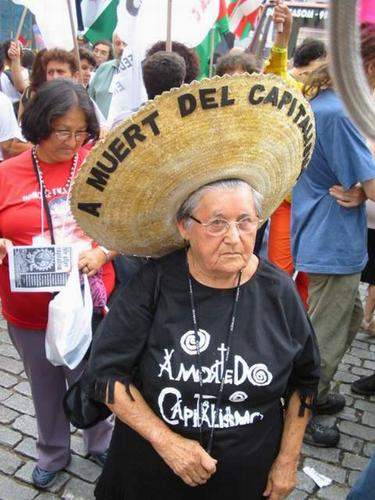
death2cap.jpgm99sa5.jpg, image/jpeg, 375x500
...Tony Blair had made a secret agreement last summer with George Bush to invade Iraq in February or March, she claimed yesterday.

death2cap.jpgm99sa5.jpg, image/jpeg, 375x500
Short: I was briefed on Blair's secret war pact
18.06.2003 [11:30]
Senior figures in the intelligence community and across Whitehall briefed the former international development secretary Clare Short that Tony Blair had made a secret agreement last summer with George Bush to invade Iraq in February or March, she claimed yesterday.
In damning evidence to the foreign affairs select committee, Ms Short refused to identify the three figures, but she cited their authority for making her claim that Mr Blair had actively deceived the cabinet and the country in persuading them of the need to go to war.
Ms Short told the first day of the committee's inquiry into the events leading up to the Iraq conflict that Mr Blair had "used a series of half-truths, exaggerations, reassurances that were not the case to get us into conflict by the spring".
She claimed Mr Blair told President Bush that "we will be with you" without laying down conditions to temper US ambitions.
She also claimed that the intelligence and diplomatic community had privately opposed the war. This is the first time she has alleged that intelligence figures had serious doubts about the need for early military action.
Justifying her charge of deception, she said: "Three extremely senior people in the Whitehall system said to me very clearly and specifically that the target date was mid-February."
She went on: "I believe that the prime minister must have concluded that it was honourable and desirable to back the US in going for military action in Iraq and therefore it was honourable for him to persuade us through various ruses and ways to get us there - so for him I think it was an honourable deception."
No 10 last night denied Ms Short's charge and said Mr Blair had worked as hard as possible to secure support for a second UN resolution that might have persuaded Saddam Hussein to cooperate.
In the same evidence session Mr Cook exonerated Mr Blair of the charge of deliberately misleading the country, but asserted that intelligence material was chosen selectively to fit a predetermined policy.
He said his own personal briefing by the Secret Intelligence Service (MI6) confirmed him in his belief that Iraq did not have weaponised chemicals, let alone weapons capable of being fired within 45 minutes, a claim made in the main intelligence document published last September.
"I think it would be fair to say there was a selection of evidence to support a conclusion," he said. "I fear we got into a position in which the intelligence was not being used to inform and shape policy, but to shape policy that was already settled."
He asserted that No 10 had "a burning fixation" with weapons of mass destruction that led Mr Blair to reject Mr Cook's view that the policy of containment was working.
Both former cabinet ministers confirmed a previous Guardian story that cabinet ministers had been given private intelligence briefings by SIS, but insisted the briefings did not indicate that the world had to act immediately to stem an imminent Iraqi threat. At best, Ms Short said, Iraq had scientists working to try to develop biological and chemical weapons, but it was wrong to suggest that meant there were "weaponised" materials.
Ms Short also claimed there was a shocking collapse in proper government procedure, with a small unelected entourage in Downing Street making the decisions without minutes, proper options papers or any written material. She said the cabinet was never shown military options papers.
She also gave the impression that the foreign secretary, Jack Straw, was a cypher who "went along" with the decisions, while the real decision-making was "sucked out" of the Foreign Office.
The vehemence of the attack by the two ex-cabinet ministers and their damning analysis of the intelligence failure over Iraq raises fresh questions for Mr Straw when he gives evidence before the committee next week.
He will defend the use of intelligence material in both public and private evidence sessions. The prime minister has declined to speak to the foreign affairs committee, but will co-operate with the private inquiry by the intelligence and security committee.
He is determined to disprove the claim that the September document was manipulated by No 10 to exaggerate the case for war.
The former UN weapons inspector Hans Blix has withdrawn his earlier offer to give evidence to the foreign affairs committee, arguing the misuse of intelligence is a matter for the British government and parliament.
www1.iraqwar.ru/iraq-read_article.php?articleId=9240&lang=en
Original: Bush & Blair's Secret War Pact Revealed